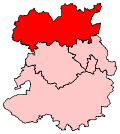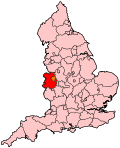North Shropshire (UK Parliament constituency)
| North Shropshire | |
|---|---|
|
County constituency for the House of Commons | |
|
Boundary of North Shropshire in Shropshire. | |
|
Location of Shropshire within England. | |
| County | Shropshire |
| Electorate | 77,673 (December 2010) |
| Major settlements | Wem, Whitchurch, Ellesmere, Oswestry, and Market Drayton |
| Current constituency | |
| Created | 1983 |
| Member of parliament | Owen Paterson (Conservative) |
| Number of members | One |
| Created from | Oswestry |
| 1832–1885 | |
| Number of members | Two |
| Replaced by | Oswestry |
| Overlaps | |
| European Parliament constituency | West Midlands |
North Shropshire[n 1] is a constituency[n 2] represented in the House of Commons of the UK Parliament since 1997 by Owen Paterson, a Conservative.[n 3]
Established for the 1832 general election, North Shropshire has been continuously held by the Conservative Party for its entire existence.[n 4] However, the constituency was abolished in 1885 and re-created in 1983.
History
From its first creation in 1832 to the abolition of the first creation in 1885 it covered approximately half of the county and elected two members, formally Knights of the Shire. In 1885 the county was (together with South Shropshire) - divided between four constituencies: Ludlow, Newport, Oswestry and Wellington.
In 1983 the constituency was revived in a smaller form and elects one Member of Parliament (MP) by the first past the post system of election.
The Electoral Reform Society considers it to be historically the safest seat in the country. Taking into account the intermediary seats roughly covering its boundaries, the Society considers that the seat has been held continuously by the Conservative Party since 1835 - in political terms since the days of the Tamworth Manifesto and before Queen Victoria's accession to the throne.[1] However the result of the 2001 election was more marginal than most Conservative seats and the 2010 election saw it just outside the top third of seats in percentage terms held by the Conservative Party, with the 103rd largest share of the vote for the party.[2]
Owen Paterson was appointed to be the Secretary of State for Northern Ireland in May 2010 and from the September 2012 Cabinet reshuffle, Secretary of State for Environment, Food and Rural Affairs.[3]
Boundaries
1983-1997: The District of North Shropshire; the Borough of Oswestry; and the District of The Wrekin wards of Church Aston, Edgmond, Ercall Magna, Newport East, Newport North, and Newport West.
1997-present: The District of North Shropshire; and the Borough of Oswestry.
The constituency is co-extensive with that of the North area of Shropshire Council, which is the same as the former districts of North Shropshire and Oswestry.
The constituency is rural and is north of Shrewsbury, west of Newcastle-under-Lyme and south of Cheshire, having five small towns.
Members of Parliament
MPs 1832–1885
- Constituency created in 1832
| Election | First member[4] | First party | Second member[4] | Second party | ||
|---|---|---|---|---|---|---|
| 1832 | Sir Rowland Hill, Bt | Tory | John Cotes | Whig | ||
| 1834 | Conservative | |||||
| 1835 | William Ormsby-Gore | Conservative | ||||
| 1843 by-election | Viscount Clive | Conservative | ||||
| 1848 by-election | John Whitehall Dod | Conservative | ||||
| 1857 | Hon. Rowland Hill | Conservative | ||||
| 1859 | John Ormsby-Gore | Conservative | ||||
| 1865 | Hon. Charles Cust | Conservative | ||||
| 1866 by-election | Hon. Adelbert Brownlow-Cust | Conservative | ||||
| 1867 by-election | Viscount Newport | Conservative | ||||
| 1876 by-election | Stanley Leighton | Conservative | ||||
| 1885 | Constituency abolished | |||||
MPs since 1983
| Election | Member[4] | Party | |
|---|---|---|---|
| 1983 | John Biffen | Conservative | |
| 1997 | Owen Paterson | Conservative | |
Elections
Elections in the 2010s
| General Election 2015: North Shropshire[5] | |||||
|---|---|---|---|---|---|
| Party | Candidate | Votes | % | ±% | |
| UKIP | Andrea Allen[6] | ||||
| Labour | Graeme Currie | ||||
| Green | Duncan Kerr[7] | ||||
| Conservative | Owen Paterson | ||||
| Liberal Democrat | Tom Thornhill | ||||
Class War originally selected Al Derby as a candidate here, but he changed to Wolverhamptom North East.[8]
| General Election 2010: North Shropshire[9] | |||||
|---|---|---|---|---|---|
| Party | Candidate | Votes | % | ±% | |
| Conservative | Owen Paterson | 26,692 | 51.5 | +1.9 | |
| Liberal Democrat | Ian Croll | 10,864 | 20.9 | +1.2 | |
| Labour | Ian McLaughlan | 9,406 | 18.1 | -7.8 | |
| UKIP | Sandra List | 2,432 | 4.7 | -0.1 | |
| BNP | Phil Reddall | 1,667 | 3.2 | +3.2 | |
| Green | Steve Boulding | 808 | 1.6 | +1.6 | |
| Majority | 15,828 | 30.5 | |||
| Turnout | 51,869 | 65.7 | +2.4 | ||
| Conservative hold | Swing | +0.3 | |||
Elections in the 2000s
| General Election 2005: North Shropshire | |||||
|---|---|---|---|---|---|
| Party | Candidate | Votes | % | ±% | |
| Conservative | Owen Paterson | 23,061 | 49.6 | +1.0 | |
| Labour | Sandra Samuels | 12,041 | 25.9 | −9.3 | |
| Liberal Democrat | Steve Bourne | 9,175 | 19.7 | +6.9 | |
| UKIP | Ian Smith | 2,233 | 4.8 | +2.3 | |
| Majority | 11,020 | 23.7 | |||
| Turnout | 46,510 | 61.4 | −1.7 | ||
| Conservative hold | Swing | +5.1 | |||
| General Election 2001: North Shropshire | |||||
|---|---|---|---|---|---|
| Party | Candidate | Votes | % | ±% | |
| Conservative | Owen Paterson | 22,631 | 48.6 | +8.4 | |
| Labour | Mike Ion | 16,390 | 35.2 | -0.8 | |
| Liberal Democrat | Ben Jephcott | 5,945 | 12.8 | -7.6 | |
| UKIP | David Trevanion | 1,165 | 2.5 | ||
| Independent | Russell Maxfield | 389 | 0.8 | ||
| Majority | 6,241 | 13.4 | |||
| Turnout | 46,520 | 63.1 | -9.5 | ||
Elections in the 1990s
| General Election 1997: Shropshire North | |||||
|---|---|---|---|---|---|
| Party | Candidate | Votes | % | ±% | |
| Conservative | Owen Paterson | 20,730 | 40.24 | ||
| Labour | Ian Lucas | 18,535 | 35.98 | ||
| Liberal Democrat | J Stevens | 10,489 | 20.36 | ||
| Referendum Party | D Allen | 1,764 | 3.42 | ||
| Majority | 2,195 | 4.26 | |||
| Turnout | 72.59 | ||||
| Conservative hold | Swing | ||||
| General Election 1992: Shropshire North[10] | |||||
|---|---|---|---|---|---|
| Party | Candidate | Votes | % | ±% | |
| Conservative | John Biffen | 32,443 | 50.5 | −1.7 | |
| Liberal Democrat | HJ Stevens | 16,232 | 25.3 | −2.2 | |
| Labour | RJ Hawkins | 15,550 | 24.2 | +3.8 | |
| Majority | 16,211 | 25.2 | +0.5 | ||
| Turnout | 64,225 | 77.7 | +2.2 | ||
| Conservative hold | Swing | +0.2 | |||
Elections in the 1980s
| General Election 1987: Shropshire North | |||||
|---|---|---|---|---|---|
| Party | Candidate | Votes | % | ±% | |
| Conservative | John Biffen | 30,385 | 52.19 | ||
| Liberal | G Smith | 15,970 | 27.43 | ||
| Labour | R Hawkins | 11,866 | 20.38 | ||
| Majority | 14,415 | 24.76 | |||
| Turnout | 75.49 | ||||
| Conservative hold | Swing | ||||
| General Election 1983: Shropshire North | |||||
|---|---|---|---|---|---|
| Party | Candidate | Votes | % | ±% | |
| Conservative | John Biffen | 28,496 | 53.44 | ||
| Liberal | D Evans | 16,829 | 31.56 | ||
| Labour | Helen Jones | 7,860 | 14.74 | ||
| Independent For Referendum | JL Phillimore | 135 | 0.25 | ||
| Majority | 11,667 | 21.88 | |||
| Turnout | 72.71 | ||||
| Conservative hold | Swing | ||||
See also
Notes and references
- Notes
- ↑ (Historically also Shropshire North and The Northern Division of Shropshire)
- ↑ A county constituency (for the purposes of election expenses and type of returning officer)
- ↑ As with all constituencies, the constituency elects one Member of Parliament (MP) by the first past the post system of election at least every five years.
- ↑ From 1832 to 1835, during the period in which the constituency had two representatives in the House of Commons, one was a Whig (a precursor to the Liberal Democrats), and the other a Conservative (officially known as a Tory until 1834).
- References
- ↑ "Safe seats", Electoral Reform Society
- ↑ General Election Results from the Electoral Commission
- ↑ "David Cameron's right turn in cabinet reshuffle". The Guardian. 4 September 2012.
- ↑ 4.0 4.1 4.2 Leigh Rayment's Historical List of MPs – Constituencies beginning with "S" (part 3)
- ↑ http://ukpollingreport.co.uk/2015guide/shropshirenorth/
- ↑ http://ukpollingreport.co.uk/2015guide/shropshirenorth/
- ↑ http://shrewsburynorthshropshire.greenparty.org.uk/news/2014/12/18/candidates-announced/
- ↑ https://yournextmp.com/person/4739/al-derby
- ↑ http://www.shropshire.gov.uk/democracy.nsf/viewAttachments/NBIP-84QFBJ/$file/Statement%20of%20Persons%20Nominated%20-%20North%20Shropshire.pdf
- ↑ "Politics Resources". Election 1992. Politics Resources. 9 April 1992. Retrieved 2010-12-06.
Sources
- UK Polling Report
- Craig, F. W. S. (1989) [1977]. British parliamentary election results 1832–1885 (2nd ed.). Chichester: Parliamentary Research Services. pp. 446–447. ISBN 0-900178-26-4.

